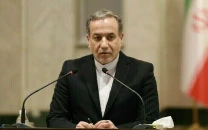The election announcement cliffhanger
Probability suggests we are heading towards a technocratic setup

The first commodity you will need in abundance if asked to put together a fantasy league of Pakistani politicians is imagination. While the new federal cabinet seems to have come into existence as a result of similar experiments with imagination there are limiting factors. For one the new team had to be picked from a parliament that is about to begin the last year of its term. Then at least a third of the players were not available for the picking as their leader was seized by the spirit of the pied piper. Where we go one, we go all, kind of stuff. But pray do not think for a moment that I am comparing the former PM’s followers to rats, kids, or the QAnon. To borrow his own words, absolutely not. The purpose is to highlight the strategy in the calculated irrationality of their behaviour and the way it impacts the talent pool of both candidates and voters. Mr Khan was repeatedly told that his replacement would come from within his party and he executed what is called the ultimate suicide pact in office politics. To the deep blue sea, we go one, we go all. A healthy sign for succession processes in our political parties.
Then remember the disparity in the number game also plays out. How can you have a dream team when you have to pick more players from one party than the other.
Speaking of succession and picking a team, it looks like the system has not fully recovered from the recent head trauma. For one there is the problem of double vision. Two of almost everything. Two finance ministers, two premiers, two energy ministers, twice the price, and on. This matter surfaced when the premier was hurriedly summoned to the UK by his elder brother along with the ranking members of the cabinet hailing from the party. Someone definitely benefited from the optics of it all. Something tells me it wasn’t the federal government or the PML-N.
Don’t get me wrong. I appreciate the legitimate concerns of a political party and its organogram. I even appreciate the situation where the system wants to keep someone out but a party gets votes in his/her name. They have to bend some rules from time to time to placate the said person. But more than succession this is a problem of delegation and trust. We already know that succession is the party’s Achilles’ heel and all power distribution is tentative. But good team leaders delegate and trust their players. That doesn’t seem to be happening. Also meeting MNS is one thing, but giving Ishaq Dar a veto on the economy when he was the first person to abandon it does not go down well with the voting public.
At any rate, the PPP and the PML-Q have shown us that their central leaders understand the system better than others. The Q league for instance understood the schizophrenia that is hampering the system. It understood how to tackle such a situation. One Chaudhary of Gujrat went away with one party, the other with the other. Yet their mutual affection remains unchanged. And in the PPP it seems that the matters of succession have either been resolved or momentarily suspended. While Asif Ali Zardari positions himself as the architect of the political structures present and future, Bilawal gets to learn the ropes as the foreign minister in the footsteps of his grandfather. If the PPP forges ahead with this harmony it may soon start looking like a more compelling national force. Of course, we mortals know the knack of self-sabotage. So far however things are moving ahead smoothly.
As for optics, the PTI may not realise but it is also facing a silent killer. After the allegations related to Farah Gogi and her husband, Ahsan Gujjar, surfaced and then the latter confessed on record regarding his enduring friendship with the former first lady’s ex-husband and of knowing Buzdar before the ex-PM himself things have taken an ugly turn. Remember that Mr Khan did not announce his match on Islamabad when he was removed from office but he came up with a deadline the day Buzdar was sacked. This story and the drip drip drip of allegations will dampen the enthusiasm of voters as the elections near. The least he can do is cut his losses and distance himself from such individuals.
Let us now talk about the nub of the gist of the problem. The election date. It is clear that the PML-N is now regretting taking over power. The ongoing economic crisis seems too big to handle in a short period. It is really concerned about the optics. While the shabby state of the economy could easily dismantle Mr Khan’s conspiracy narrative the PML-N has not paid any heed to his initial conclusions about the so-called conspiracy. The PTI, in the meanwhile, thinks that it can win big if early elections are called.
Sadly, these assumptions are mere assumptions. Mr Khan and his party are masters of public rallies. This has been going on since 1996. But this pull grows weak when it comes to fence-sitters and the rural population. If you talk to any credible pollster or any half-decent actuary you will learn that the chances of elections returning an even tightly hung parliament are much higher. This is due to many factors. One, the number of viable actors (PPP, religious parties, TLP et al) is increasing every day. Two, the animus between the PTI and the traumatised system. And finally, the PML-N’s loyal vote base which survived even Gen Musharraf’s eight years of anti-Nawaz rule.
And the economy continues to melt down in the meantime. Two cases are instructive — Afghanistan where an entire state vanished in the wisps of smoke before our eyes and Sri Lanka which is going to pieces as we speak. An early election would suspend all proactive measures needed to rescue the economy. For three months at least, a caretaker government will step in which will not have the constitutional mandate to make long-lasting decisions. And even after that, there is no guarantee that a stable government with a clear majority will emerge. What happens if a country with such a struggling economy gets caught in an election-spiral Israel? Bedlam. But taking tough decisions without broad consensus might create a Sri Lanka-like situation. Consensus will not come under a political government in this polarised environment. Probability suggests we are heading towards a technocratic setup with a clearly stipulated time period that is longer than the usual period meant for a caretaker setup. Common sense tells us that expecting such sanity from our politics is foolish. And that we are invariably heading towards a disaster.
Published in The Express Tribune, May 14th, 2022.
Like Opinion & Editorial on Facebook, follow @ETOpEd on Twitter to receive all updates on all our daily pieces.














COMMENTS
Comments are moderated and generally will be posted if they are on-topic and not abusive.
For more information, please see our Comments FAQ